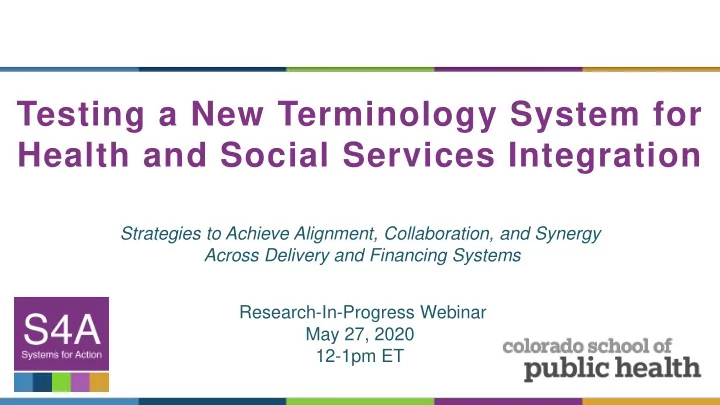

Testing a New Terminology System for Health and Social Services Integration Strategies to Achieve Alignment, Collaboration, and Synergy Across Delivery and Financing Systems Research-In-Progress Webinar May 27, 2020 12-1pm ET
Agenda Welcome: Glen Mays, PhD, MPH Director for Systems for Action Presenters: Sara Abiola, PhD, JD Columbia University Miriam Laugesen, PhD Columbia University Q&A: Moderated by Glen Mays, PhD
Presenters Dr. Abiola's research focuses on the relationship between public policy and population health with an emphasis on food law and noncommunicable diseases, overweight, and obesity among children, adolescents, and young adults. Her most recent work includes constructing a country-level index for NCD prevention laws that aggregates existing law and policy data about food, alcohol, tobacco regulations into a single measure, developing a theoretical framework for linking laws to health- related behaviors and outcomes, and identifying factors that shape the use of evidence in public Sara Abiola, PhD, JD policymaking. Dr. Abiola also explores statutory Assistant Professor and regulatory mechanisms to integrate the delivery of health and social services to address the social determinants of health and the effects of state-level laws on youth overweight and obesity.
Presenters Dr. Laugesen is the author of Fixing Medical Prices: How Physicians are Paid (Harvard University Press) and is presently a Tow Foundation Faculty Scholar, an award recognizing innovation and thought leadership. Her work has contributed to an increased awareness of how healthcare prices are determined and why they are higher than elsewhere. Dr Laugesen is the current President of the American Political Science Association's Health Politics and Policy Section; she serves on the AcademyHealth Education Council, and she is the Book Review Editor for the Journal of Health Politics, Policy Miriam Laugesen, PhD and Law. Associate Professor
Agenda 1. Introduction of Two Polling Questions for the Audience 2. Review of Study Aims and Findings (Aims 1, 2, 3) 3. Conclusion 4. Next Steps and Emerging Projects 5. Q&A 6. S4A Announcements
Poll Question (1) 1. In your opinion, thinking across sectors, how much progress do you believe has been made, to date, on social and health services integration in the United States? Pick ONE of the following: A. I don’t know B. Very limited C. Some, but limited overall D. Inconsistent degrees of integration E. Considerable progress across sectors
Poll Question (2) 2. Do you believe the COVID-19 crisis has strengthened or weakened the likelihood of greater social and health services integration occurring in the United States? Pick ONE of the following: A. Not sure B. No impact on integration C. Reduced the likelihood D. Somewhat strengthened E. Significantly strengthened the likelihood of integration
Study Aim 1 • Investigate the implementation and impact of strategies designed to achieve alignment, collaboration, and synergy across delivery and financing systems by describing the scope and structure of current legal and regulatory approaches to reimbursement for nonmedical service providers and system gaps.
Study Aim 2 • Investigate the role of incentives in achieving alignment, collaboration, and synergy across delivery and financing systems and test the technical feasibility of extending or developing new parallel mechanisms, such as expanding the existing “T” codes used to pay for social services.
Study Aim 3 • Investigate the implementation and impact of strategies designed to reduce and eliminate health inequities through cross-system alignment, collaboration, and synergy by testing the acceptability and alternative options through engagement with health and social service stakeholders.
Conclusion • Implications for ongoing health and social services integration • Creating common language across sectors • Using the COVID-19 pandemic to mobilize greater cross-sector communication • Highlighting ability of systems to be efficient, flexible, and responsive to needs of a population • Review of poll results
Next Steps • Expanding T code utilization • Medicare use and benefits of standardization • Overcoming barriers to more widespread adoption of T codes • Medical provider awareness re: T codes • Nonmedical provider knowledge: increasing awareness about existing integration • Defining health through a social determinants lens • Initial strategy : dissemination of study findings (op-ed)
Emerging Related Projects • Addressing food insecurity during and after COVID-19: • Highlighting the need for policies that increase access to SNAP benefits • Policy surveillance and mapping in relation to SNAP benefits (50 state analysis) • Climate change and food access in urban settings • Integration of federal social safety net policies and benefits
Recap – Poll 1 1. In your opinion, thinking across sectors, how much progress do you believe has been made, to date, on social and health services integration in the United States ? Pick ONE of the following: A. I don’t know B. Very limited C. Some, but limited overall D. Inconsistent degrees of integration E. Considerable progress across sectors
Recap – Poll 2 2. Do you believe the COVID-19 crisis has strengthened or weakened the likelihood of greater social and health services integration occurring in the United States? Pick ONE of the following: A. Not sure B. No impact on integration C. Reduced the likelihood D. Somewhat strengthened E. Significantly strengthened the likelihood of integration
Final Audience Question Q: After listening to today‘s talk, which word comes immediately to mind when you think about integration of social and health services? Please enter answer into chat box.
Questions? www.systemsforaction.org @Systems4Action
Certificate of Completion If you would like to receive a certificate of completion for today’s ResProg webinar, please complete the survey at the end of the session. One will be emailed to you.
Upcoming Webinars June 10 | 12 pm ET Using Global Budgets and Multi-Sector Teams to Align Systems in Vermont Adam Atherly, PhD, University of Vermont June 24 | 12 pm ET Investigating Systems Alignment of Multi-Sector Agencies to Address Child Maltreatment in St. Louis Melissa Jonson-Reid, PhD & Trisha Kohl, PhD, Washington U in St. Louis
Acknowledgements Systems for Action is a National Program Office of the Robert Wood Johnson Foundation and a collaborative effort of the Colorado School of Public Health, administered by the University of Colorado Anschutz Medical Campus, Aurora, CO.
Recommend
More recommend